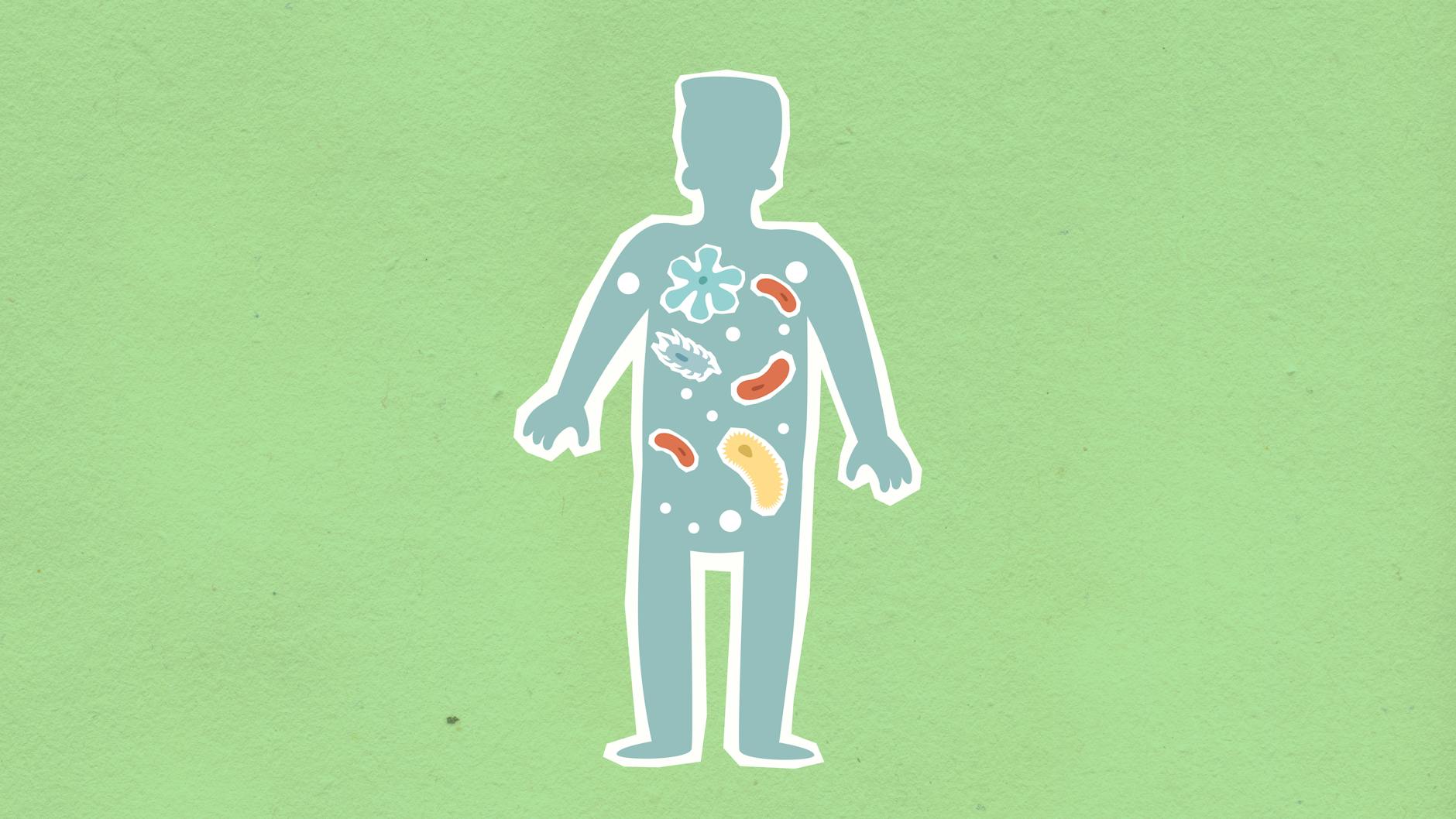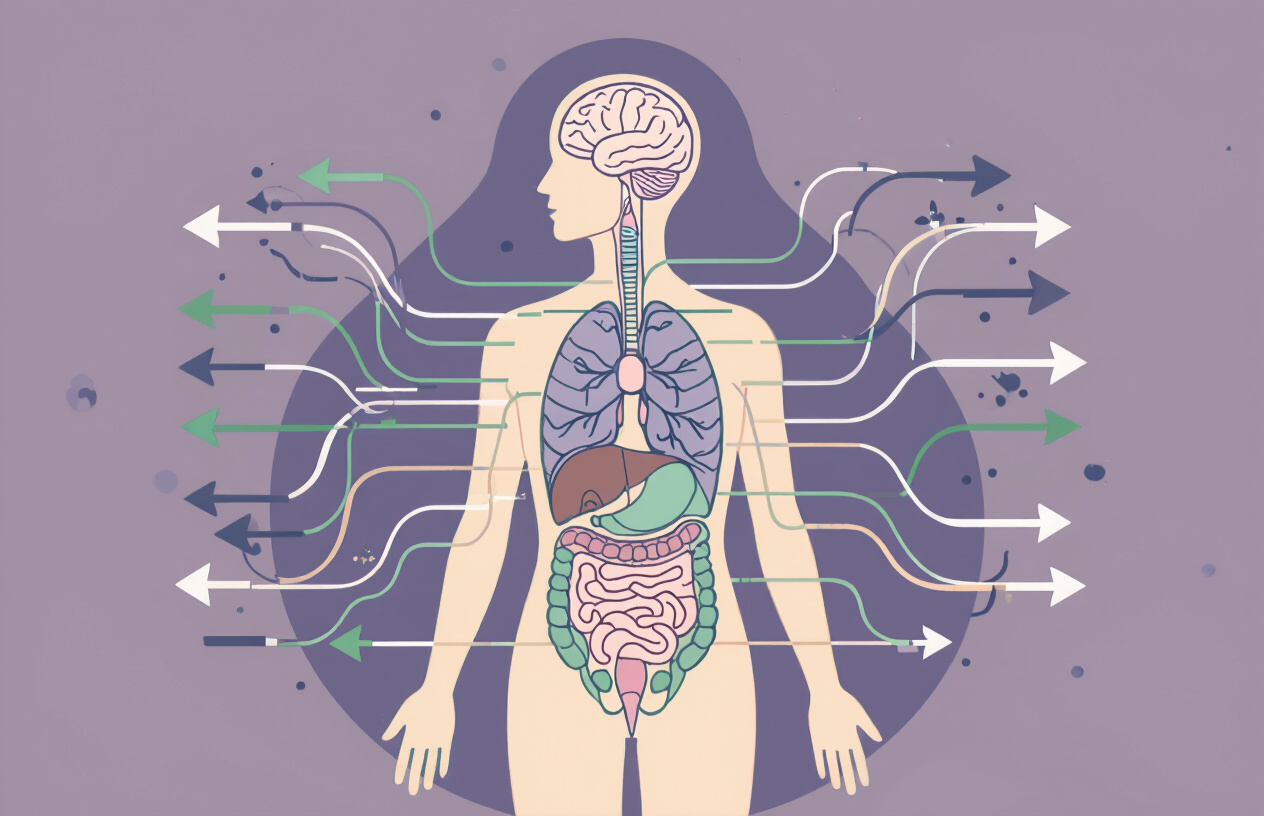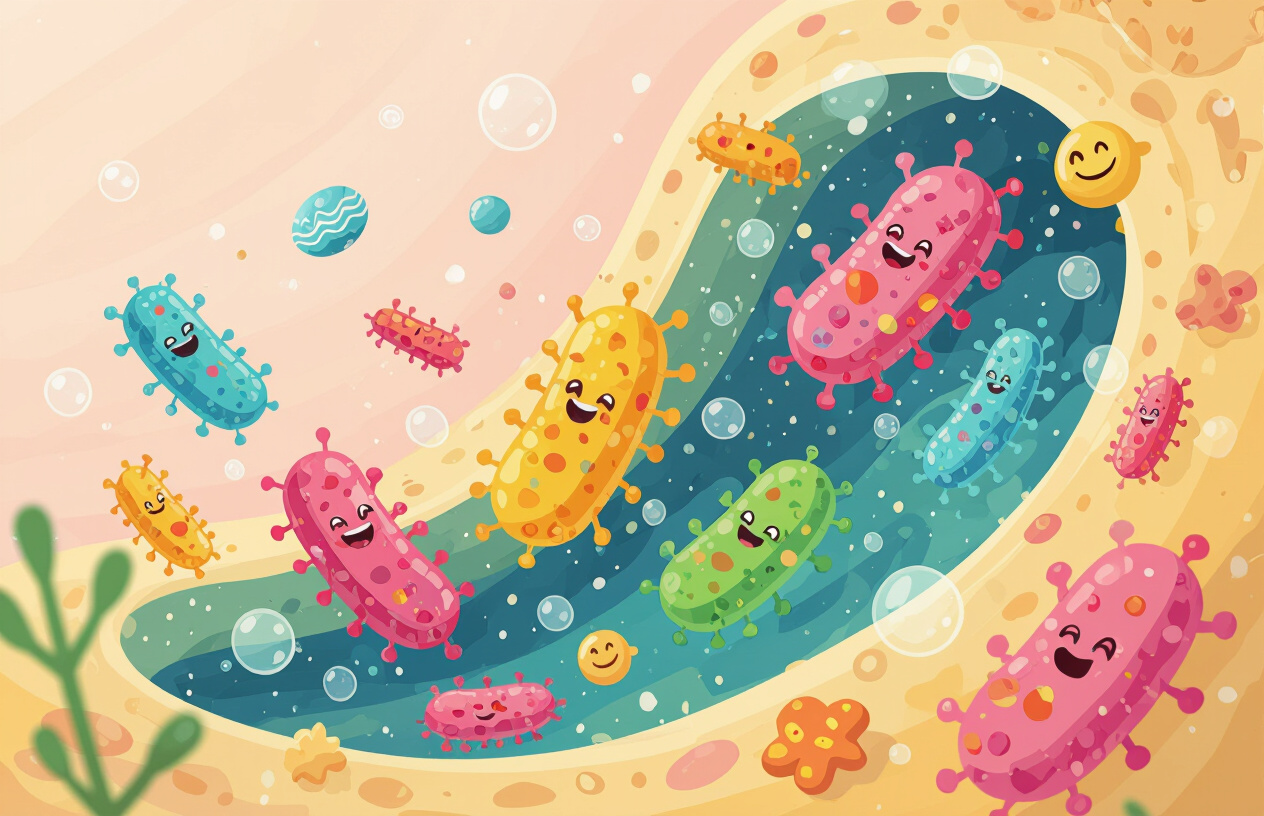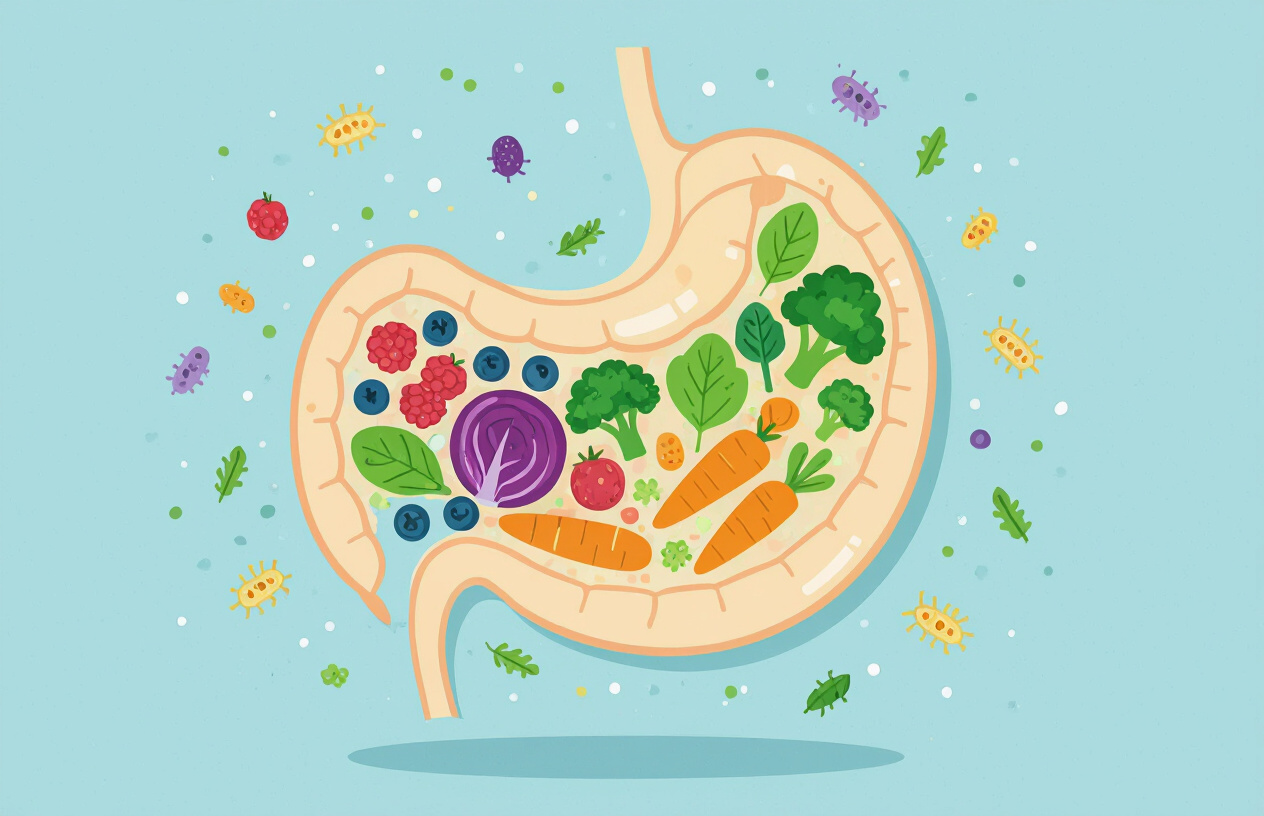Fix Your Mood Swings with Simple Gut Health Tips

Photo by Monstera Production on <a href="https://www.pexels.com/photo/paper-applique-of-human-figure-with-bacteria-5841764/" rel="nofollow">Pexels.com</a>
Understanding the Gut-Brain Connection: How Your Microbiome Affects Your Mood
The Science Behind Your Gut Microbiome and Emotional Health
You’ve probably had “gut feelings” or experienced butterflies when nervous—these aren’t just expressions but reflect a real biological connection. Your gut and brain talk to each other constantly through what scientists call the gut-brain axis. This communication highway works through neural pathways (primarily the vagus nerve), immune signals, and hormonal messengers that create a two-way street between your digestive system and your brain.

What’s fascinating is that your gut actually produces many of the same chemicals your brain uses to regulate mood. About 95% of your body’s serotonin—the “feel-good” neurotransmitter—is made in your intestines, not your brain. Your gut also produces GABA (which helps calm anxiety) and dopamine (involved in pleasure and reward).
The trillions of bacteria living in your gut directly influence how these mood-regulating chemicals are produced and function. These microscopic roommates help break down food, but they also create byproducts that affect neurotransmitter levels.
 Some gut bacteria can even produce these neurotransmitters themselves! When your gut microbiome is balanced, this production runs smoothly. When it’s not, your emotional health can suffer.
Some gut bacteria can even produce these neurotransmitters themselves! When your gut microbiome is balanced, this production runs smoothly. When it’s not, your emotional health can suffer.
Signs Your Gut Health Is Affecting Your Mood Stability
If you’re experiencing unexpected mood swings, anxiety, depression, or brain fog alongside digestive issues, your gut might be sending distress signals. Common emotional symptoms linked to poor gut health include:
- Unexplained irritability or sadness
- Anxiety that worsens after meals
- Difficulty concentrating or thinking clearly
- Mood crashes after eating certain foods
These emotional symptoms often come with physical clues like bloating, irregular bowel movements, heartburn, or food sensitivities. If your mood improves after dietary changes, that’s another sign your gut might be influencing your emotions.
Ask yourself: Do your mood swings coincide with digestive discomfort? Do certain foods seem to trigger both emotional and digestive reactions? Does stress immediately upset your stomach? If you answered yes to these questions, your gut health might be affecting your emotional stability.
Practical Gut Health Solutions for Emotional Stability
Quick Dietary Changes That Balance Your Gut and Mood
Your gut microbiome thrives on variety and fiber-rich foods. Start incorporating fermented foods like yogurt, kimchi, and sauerkraut daily—they deliver live beneficial bacteria straight to your gut. Colorful fruits and vegetables aren’t just pretty; they contain polyphenols that feed good bacteria while fighting inflammation.
 Berries, leafy greens, and purple vegetables work particularly well for mood balance.
Berries, leafy greens, and purple vegetables work particularly well for mood balance.
Replace inflammatory cooking oils (like vegetable and corn oil) with anti-inflammatory alternatives such as olive or avocado oil. Swap refined carbohydrates for whole grains like oats, quinoa, and brown rice, which provide steady energy and feed beneficial gut bacteria.
The timing of your meals matters too. Eating on a regular schedule helps maintain healthy gut rhythms. Try allowing 12-14 hours between dinner and breakfast as an easy form of intermittent fasting that gives your gut microbiome time to recover and rebalance overnight.
Sample 3-Day Mood-Stabilizing Meal Plan:
- Day 1: Breakfast: Greek yogurt with berries and walnuts; Lunch: Lentil soup with leafy greens; Dinner: Baked salmon with roasted sweet potatoes and broccoli
- Day 2: Breakfast: Overnight oats with cinnamon and apple; Lunch: Quinoa bowl with roasted vegetables and avocado; Dinner: Turkey and vegetable stir-fry with brown rice
- Day 3: Breakfast: Smoothie with spinach, banana, and flaxseed; Lunch: Mediterranean salad with chickpeas and olive oil dressing; Dinner: Vegetable and bean soup with a side of sauerkraut
Probiotic and Prebiotic Solutions You Can Start Today
Research shows specific probiotic strains directly impact mood regulation. Look for supplements containing Lactobacillus acidophilus, Bifidobacterium longum, and Lactobacillus rhamnosus—all linked to reduced anxiety and improved emotional balance. For natural sources, unsweetened yogurt, kefir, and kombucha deliver beneficial bacteria straight to your gut.
Prebiotics—the food for your good bacteria—are just as important. Onions, garlic, bananas, Jerusalem artichokes, and asparagus all contain prebiotic fibers that help beneficial bacteria flourish. Add these to your daily meals for a steady supply.
When choosing probiotic supplements, check for:
- Multiple strains (at least 3 different types)
- CFU count (colony-forming units) of 10-50 billion
- Enteric coating for protection against stomach acid
- Proper storage requirements (some need refrigeration)
Most people begin noticing subtle mood improvements within 2-4 weeks of consistent probiotic use, though full benefits may take up to 3 months as your gut microbiome gradually rebalances.
Stress Management Techniques That Protect Your Gut Microbiome
Your stress response directly impacts gut health, creating a vicious cycle of mood swings. Break this pattern with these quick interventions:
5-Minute Gut-Friendly Stress Reducers:
- Diaphragmatic breathing: Lie down, place one hand on your belly, and breathe deeply so your hand rises with each inhale. Just 5 minutes lowers cortisol and reduces gut inflammation.
- Progressive muscle relaxation: Tense and release each muscle group for 5 seconds, moving from feet to head.
- Mindful eating: Focus completely on the taste, texture, and smell of one food item for 5 minutes.
Your vagus nerve is the communication superhighway between gut and brain. Strengthen this connection with:
- Humming or singing for 2-3 minutes
- Cold water face splashing each morning
- Gentle gargling for 30-60 seconds twice daily
Sleep is when your gut repairs itself. Improve your sleep quality by:
- Establishing a consistent sleep-wake schedule
- Avoiding eating within 3 hours of bedtime
- Creating a completely dark, cool sleeping environment
- Limiting blue light exposure from screens 90 minutes before bed
Common Habits to Avoid That Sabotage Your Gut-Mood Balance
Your gut microbiome is sensitive to many common ingredients. Check labels for these hidden gut disruptors:
- Artificial sweeteners (especially aspartame and sucralose)
- Emulsifiers like carrageenan and polysorbate-80
- Added sugars (even seemingly healthy ones like agave)
- Food colorings and preservatives
Several lifestyle patterns damage gut health beyond diet:
- Excessive alcohol consumption (limit to 1 drink daily or less)
- Inconsistent eating schedules
- Overuse of antibiotics and NSAIDs
- Chronic dehydration
Digital habits surprisingly impact your gut-mood connection:
- Constant notification checking raises cortisol, harming gut bacteria
- Doomscrolling before bed disrupts sleep-dependent gut repair
- Multi-tasking during meals reduces proper digestion
Try a weekly digital detox for 24 hours and notice how your digestive symptoms and mood improve.
Tracking Your Progress: Simple Ways to Monitor Gut-Mood Improvements
Keep a simple daily log tracking:
- Mood ratings (1-10) at breakfast, lunch, and dinner
- Energy levels throughout the day
- Digestive symptoms (bloating, discomfort, regularity)
- Sleep quality
Physical signs your gut health is improving include:
- More consistent bowel movements
- Reduced bloating and gas
- Fewer food cravings, especially for sugar
- Improved skin clarity
- More stable energy throughout the day
Most people notice initial improvements within 2-3 weeks of consistent gut-friendly habits. However, meaningful mood stabilization typically takes 6-8 weeks as your gut microbiome gradually rebalances. Once established, maintaining these habits becomes easier as you experience their benefits.
While gut health significantly influences mood, persistent symptoms warrant professional attention. Consult a healthcare provider if you experience:
- Severe mood swings that interfere with daily functioning
- Digestive symptoms that don’t improve with dietary changes
- Worsening symptoms despite following gut-health protocols
- Any thoughts of self-harm or hopelessness
Remember that gut health is just one piece of emotional well-being—sometimes additional support is needed and entirely appropriate.




